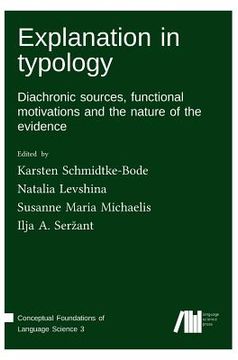Synopsis "Explanation in Typology (in English)"
This volume provides an up-to-date discussion of a foundational issue that has recently taken centre stage in linguistic typology and which is relevant to the language sciences more generally: To what extent can cross-linguistic generalizations, i.e. statistical universals of linguistic structure, be explained by the diachronic sources of these structures? Everyone agrees that typological distributions are the result of complex histories, as "languages evolve into the variation states to which synchronic universals pertain" (Hawkins 1988). However, an increasingly popular line of argumentation holds that many, perhaps most, typological regularities are long-term reflections of their diachronic sources, rather than being 'target-driven' by overarching functional-adaptive motivations. On this view, recurrent pathways of reanalysis and grammaticalization can lead to uniform synchronic results, obviating the need to postulate global forces like ambiguity avoidance, processing efficiency or iconicity, especially if there is no evidence for such motivations in the genesis of the respective constructions. On the other hand, the recent typological literature is equally ripe with talk of "complex adaptive systems", "attractor states" and "cross-linguistic convergence". One may wonder, therefore, how much room is left for traditional functional-adaptive forces and how exactly they influence the diachronic trajectories that shape universal distributions. The papers in the present volume are intended to provide an accessible introduction to this debate. Covering theoretical, methodological and empirical facets of the issue at hand, they represent current ways of thinking about the role of diachronic sources in explaining grammatical universals, articulated by seasoned and budding linguists alike.

